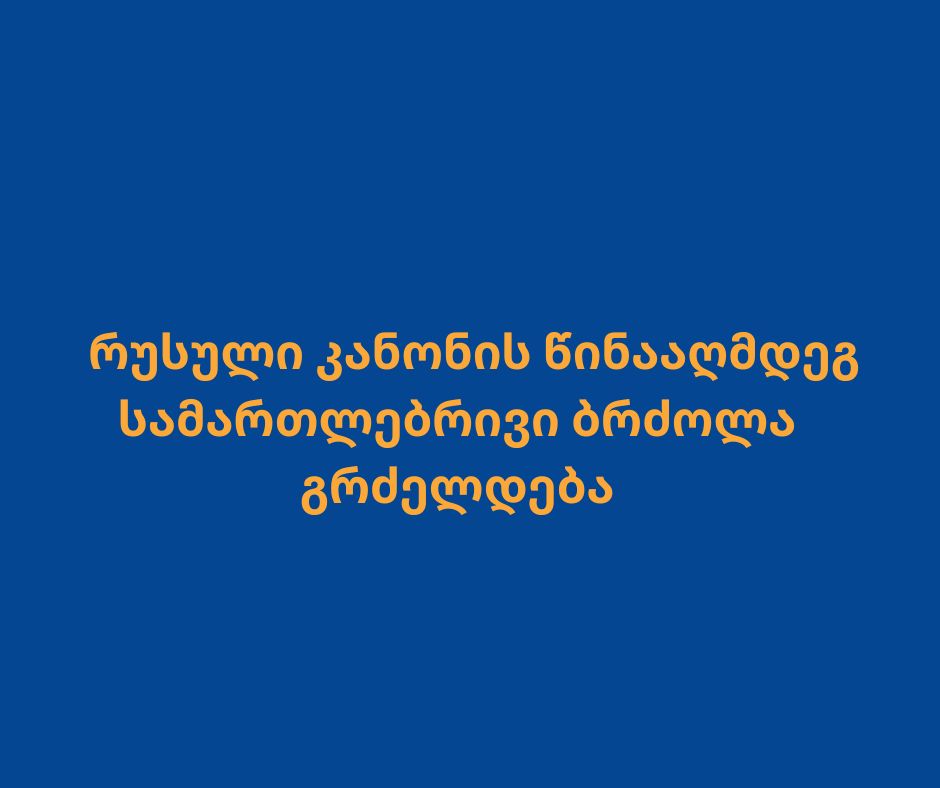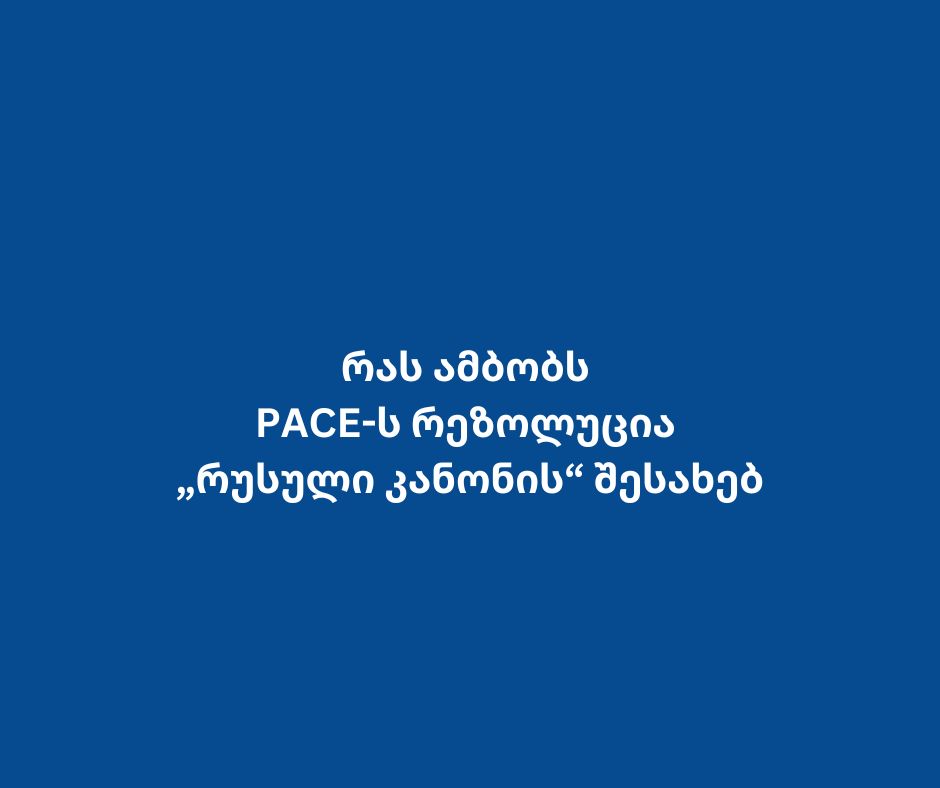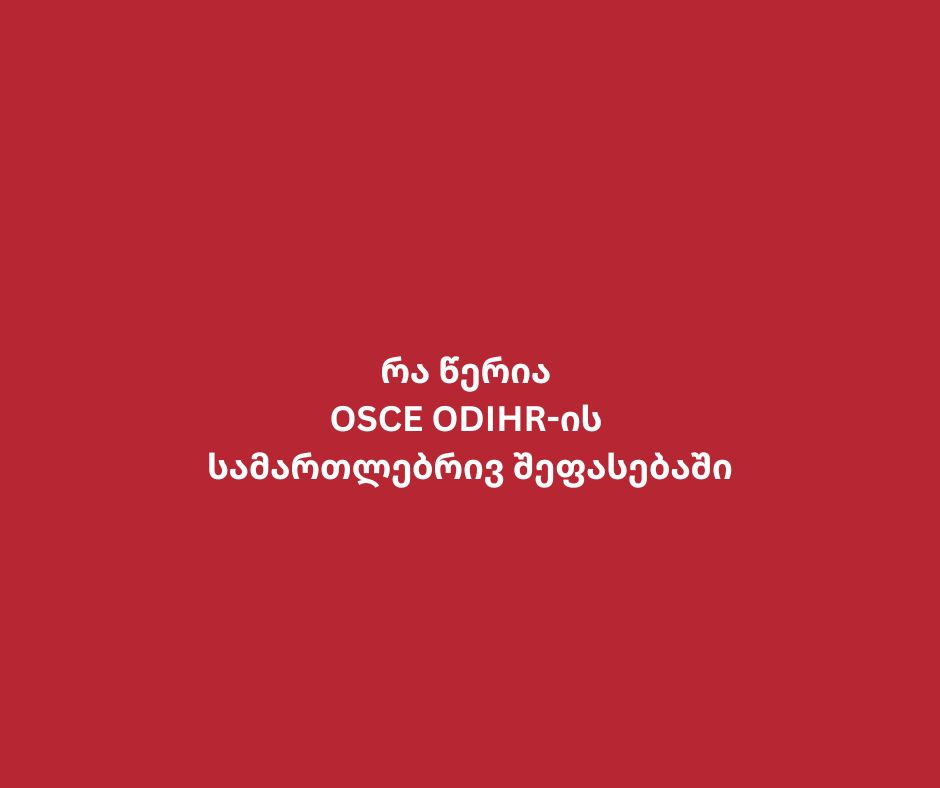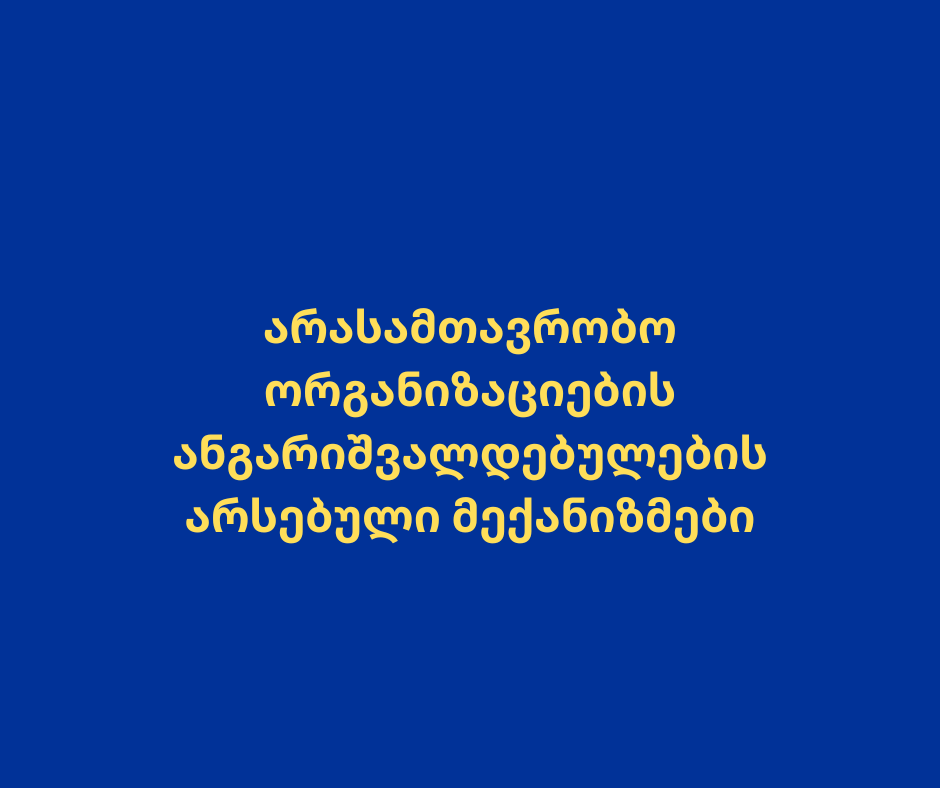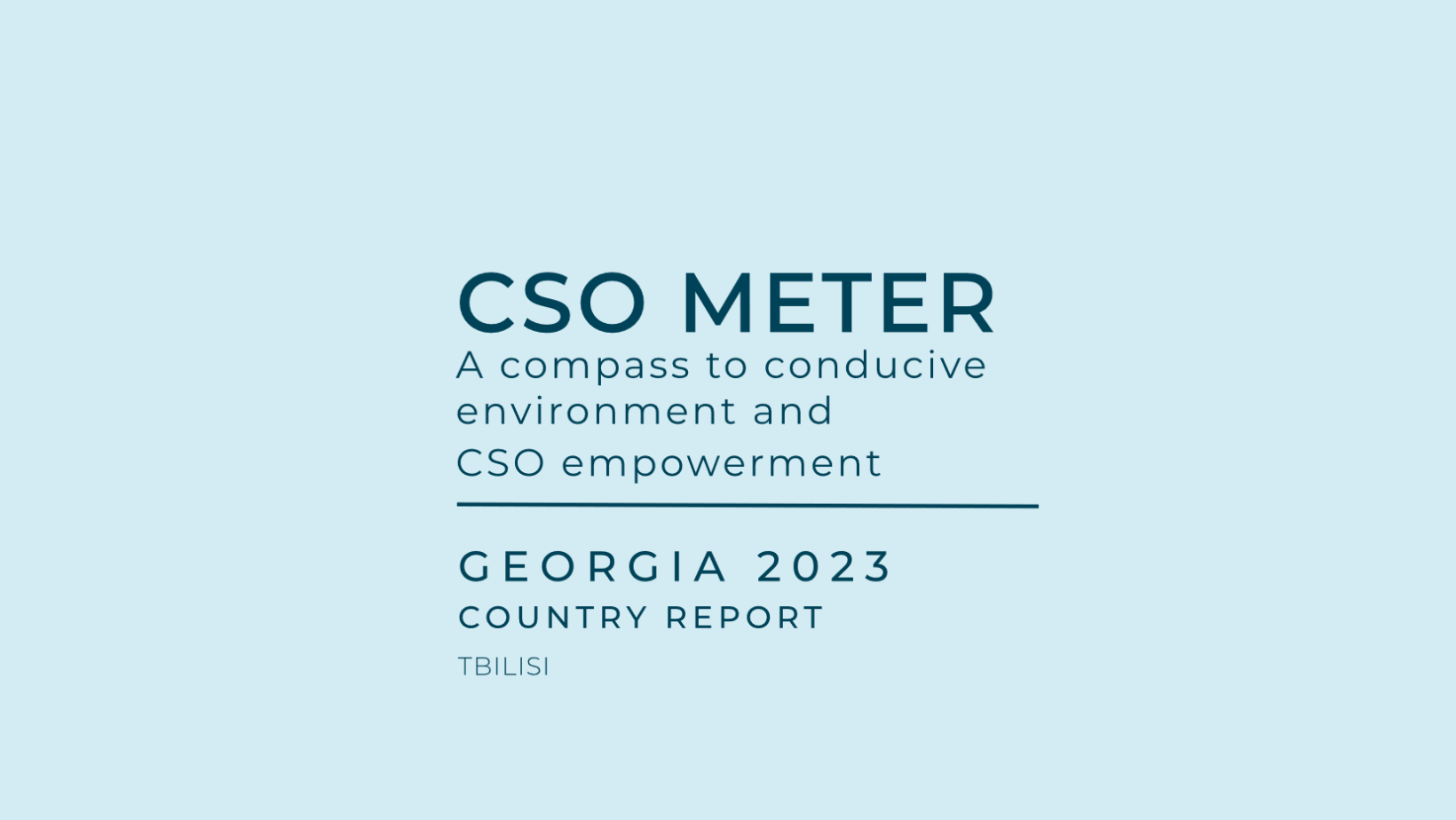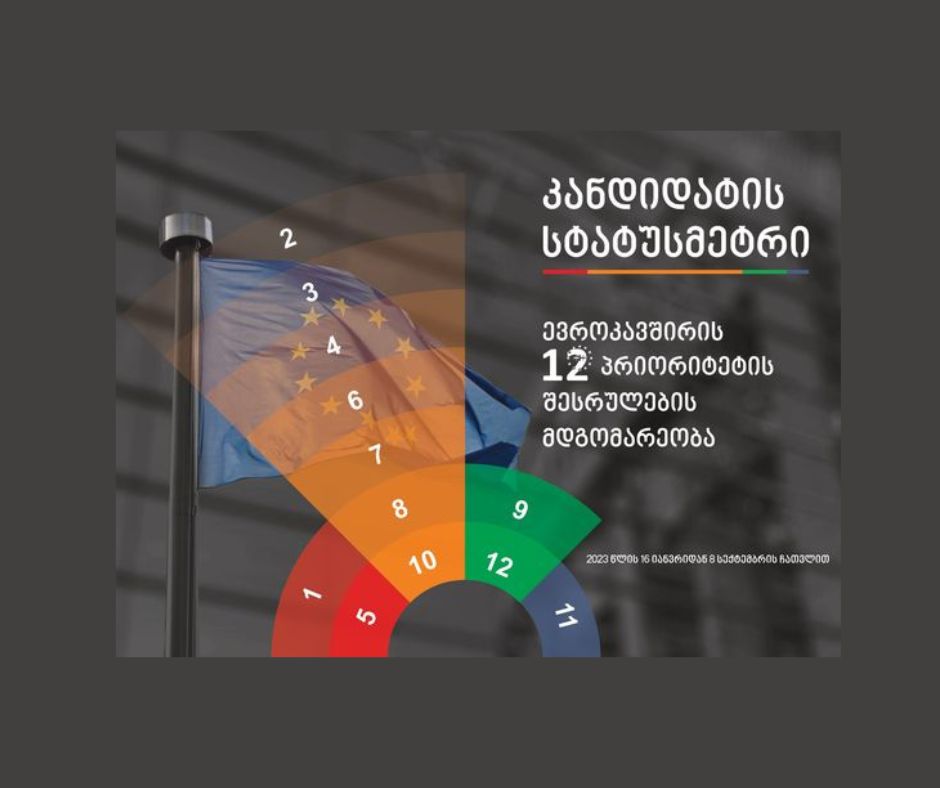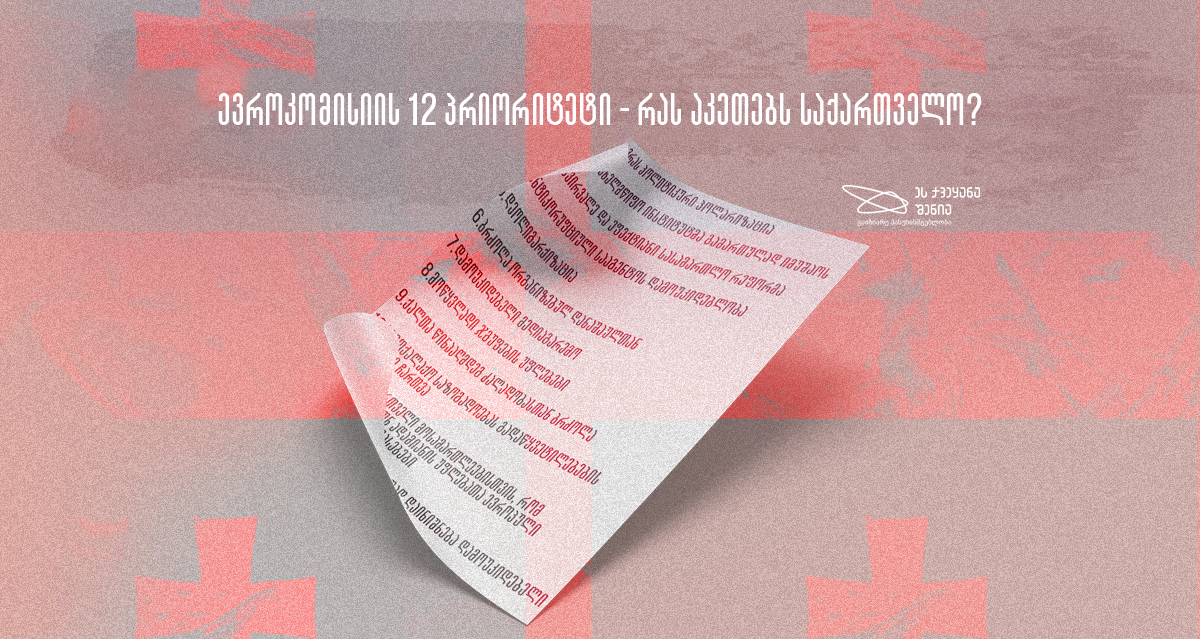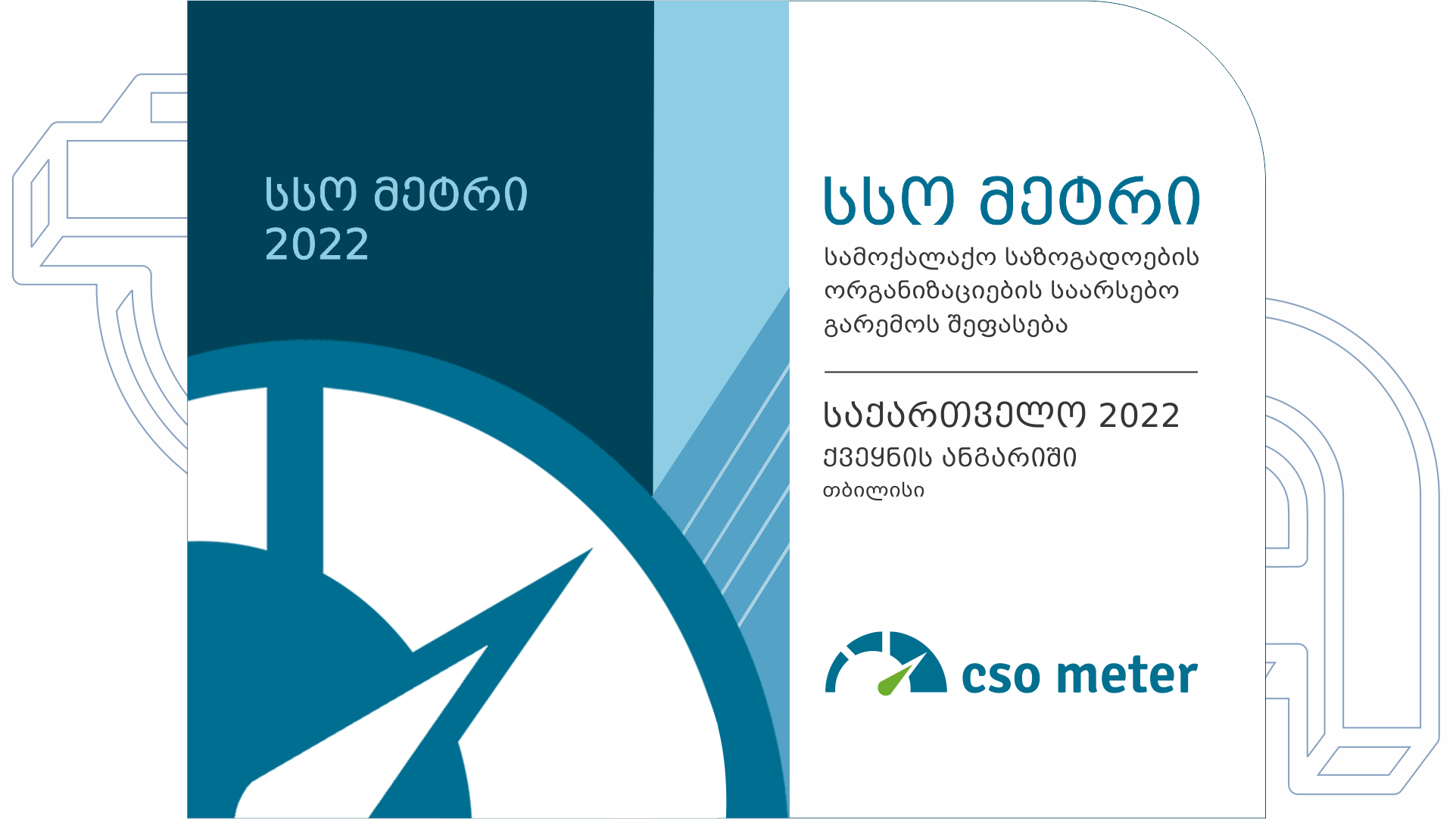Popular

17/08/2020

05/01/2020

06/02/2025
On February 5, one of the leaders of „Georgian Dream“, Mamuka Mdinaradze, publicly announced that the party plans to adopt new legislative amendments that, among other things, will tighten the state's approach to the media and civil society organizations.
Civil society groups already view the proposed changes as a 'repressive' measure by the party, aimed at restricting the work of civil society organizations and the media in the country.
According to Mdinaradze:
Provisions mandating the participation of non-governmental organizations in the public decision-making process will be removed from the legislation;
Instead of the existing so-called Russian law, they will introduce a draft law that is 'a direct copy of the current version of the American FARA' and will ensure its full implementation;
A budget fund will be created to finance initiatives of public organizations, for which amendments will be made to the Law on Grants;
A media law will be drafted to define standards for media objectivity and journalistic ethics. Additionally, foreign funding for media outlets will be restricted.
„Georgian Dream’s“ plan to remove the mandatory involvement of civil society organizations in the decision-making process would eliminate even formal opportunities for cooperation between the state and civil society. This decision would also further harm Georgia’s standing in the Open Government Partnership (OGP), especially given that the country’s membership is already temporarily suspended, with a final suspension decision expected in early 2026.
Moreover, if implemented, this initiative would directly contradict the 9th condition for opening negotiations with the European Union, which requires Georgia to ensure civil society’s participation in law-making and policy-making processes.
Given the current context, where the majority of organizations have not been registered in the register of organizations carrying foreign influence, the new law—set to replace the existing 'Russian law,' according to Mamuka Mdinaradze’s statement—is expected to be even more repressive and punitive towards civil society organizations. This initiative represents yet another step to impede the work of civil society.
On the other hand, the creation of a budgetary fund intended to cooperate with civil society organizations seems aimed at establishing a parallel civil sector and creating a virtual partnership.
In turn, restricting foreign funding for media outlets will cause irreparable damage to the existing media landscape in Georgia. This initiative is particularly concerning for digital publications, which rely more heavily on non-commercial sources of income. The worsening environment for media outlets will have a negative impact on freedom of speech and freedom of the press in the country.
As a result, the changes that Georgian Dream plans to implement will further deteriorate the environment for civil society organizations, effectively eliminate space for potential cooperation, and impose additional restrictions on media.
On August 1, 2024, the order of the Minister of Justice of Georgia was published. This order outlines the rules for the creation of the registry, the submission of financial declarations, and the monitoring procedures based on the "Russian law" on the transparency of foreign influence.
Before that, on July 29, the Minister of Justice of Georgia issued an order to create a new unit within the National Public Registry Agency called the Financial Declaration Department. Among other responsibilities, this department will be tasked with producing and publicizing the “Register of Organizations Pursuing the Interests of a Foreign Power”.
It should be noted that a significant portion of civil society organizations do not plan to voluntarily register in the mentioned register or submit financial declarations, as they believe these requirements are not about transparency but rather about discrediting the organizations. However, the law's requirements may also pose challenges for those organizations that are considering registering.
The financial declaration defined by the normative act issued by the Minister of Justice on August 1st requires organizations to submit, among other obligations, detailed identification data about all individuals associated with the organization for whom any expenses were incurred during the reporting period. Notably, this requirement also applies to individuals who provide funding. This applies to the 2023 data as well, the collection of which, under the new rules, poses significant challenges for many organizations.
Gathering and processing the mentioned information, due to its volume and sensitivity, as well as the need to mobilize additional human and financial resources, may pose significant challenges for many organizations. This could potentially lead to the disruption of these organizations and the interruption of their work.
In addition, seeking such detailed information in the future may erode trust in the process among beneficiaries, which could be particularly damaging to service providers and organizations working with vulnerable groups, ultimately significantly hindering their work.
It is also worth noting that the "Russian Law" gives organizations a one-month deadline to submit a written application for registration as an organization pursuing the interests of foreign powers. After that, within 2 days, the organization will gain access to the "proper website," where it must complete an application within 10 working days. This application also serves as the financial declaration.
Based on this, the law allows approximately one and a half months for the preparation and submission of the declaration. If an application is incorrectly or incompletely filled out, the organization must correct the defects within 10 working days.
For comparison, business entities are given 9 months for reporting under the law of Georgia On Accounting, Reporting and Audit. Interestingly, when changes to the reporting rules for business entities were introduced—which differ in essence from those for civil society organizations and the media—the preparatory period lasted two years. During this time, the state also provided information and guidance about the changes.
Shortened deadlines for completing and submitting financial declarations pose an additional obstacle for organizations and negatively impact their operations.In addition, those requirements suggest that the purpose of the law's implementation may not be to ensure the transparency of organizations but to hinder their work.
Finally, the mentioned requirements—along with existing and future difficulties related to searching for and processing information, and the shortened deadlines for submitting the financial declaration—will negatively impact the work of civil society actors who either voluntarily register or intend to submit the declaration after the state registers them in the registry. This may ultimately lead to the suspension of their activities.
These difficulties further deteriorate the operating environment for civil society organizations and hinder their ability to provide advocacy and services.
The legal battle against the Law on Transparency of Foreign Influence, often referred to as the 'Russian Law,' continues in the Constitutional Court.
After the law was adopted, discussions about filing a lawsuit with the Constitutional Court became more active among political circles and civil society. On May 30, Georgian civil society organizations announced that they were preparing a constitutional lawsuit to be submitted to the court. Finally, in July, three different lawsuits were filed with the court. The first was President Salome Zourabichvili’s lawsuit, submitted on July 15. This was followed by a general lawsuit from civil society organizations, announced on July 17, and a joint lawsuit signed by 38 opposition MPs.
In the lawsuit submitted by the President, which the court has accepted, it is argued that the law is unconstitutional and in violation of Article 78 of the Georgian Constitution. The lawsuit also challenges a number of norms of the law that infringe upon fundamental rights guaranteed by the Constitution.
Through this action, the President is seeking both a suspension of the law and its ultimate repeal. The President's lawsuit is precedential because:
It marks the first instance in which the President has brought a case before the Constitutional Court.
To date, the Constitutional Court has not yet adjudicated a case concerning the violation of Article 78 of the Constitution, which pertains to integration into European and Euro-Atlantic structures.
On the other hand, the lawsuits brought by civil society and media organizations highlight that the law infringes upon the right of individuals to associate with like-minded people to engage in beneficial activities and assist others. These lawsuits argue that by enacting the Russian law, the government is fostering a hostile and demeaning environment, thereby threatening the exercise of rights and freedoms related to association, expression, and other fundamental liberties. Civil society and media organizations, in conjunction with their lawsuit, are also calling for a temporary suspension of the implementation of the unconstitutional norms of the law until the court reaches a final decision.
The lawsuit filed by the opposition MPs became known on July 29. The deputies are requesting the Constitutional Court to analyze the Law "On Transparency of Foreign Influence" in relation to Articles 22 (freedom of association) and 78 (integration into European and Euro-Atlantic structures) of the Constitution and to annul it. They also request that the court implement a temporary mechanism to suspend the enforcement of the law until a final decision is reached.
Under the legislation, the review period for a constitutional claim or submission should not exceed 9 months, beginning from the date the claim or submission is registered with the Constitutional Court. Additionally, the Chairman of the Constitutional Court may extend this period by up to 2 months in special cases. It's important to note that the expiration of this period does not automatically result in a court decision on the claim or submission, as the law does not specify a deadline for the court to issue a final decision.
On June 27, the Parliamentary Assembly of the Council of Europe (PACE) passed a resolution with 66 votes in favor and 4 against, highlighting the challenges facing democracy in Georgia. The concerns outlined in this resolution were echoed in the decisions and calls made by the European Council.
The resolution text states that the Parliamentary Assembly expresses deep concern over recent developments in Georgia, which raise serious doubts about the country's commitment to international democratic norms and its Euro-Atlantic aspirations.
According to the resolution, the Assembly fully supports the conclusion of the Venice Commission regarding the law on transparency of foreign influence. It considers that this law, along with the manner of its adoption, is incompatible with European democratic and human rights standards. The Assembly believes that this law is unrelated to the financial transparency of non-profit entities, including civil society organizations and the media, or to deterring hostile foreign influence. Instead, it enables the government to exert undue political control over civil society and the media.
According to PACE's resolution, the law should be repealed without further delay.
According to the resolution, the adoption of this law is not an isolated incident but represents a culmination of events that clearly demonstrate democratic backsliding in the country. The Assembly calls on Georgia to return to the democratic path, emphasizing that this should be demonstrated not only through words but also through clear actions.
The resolution also states that the adoption of the law on transparency of foreign influence cannot be considered in isolation from the upcoming parliamentary elections in Georgia, scheduled for October 26, 2024. The Assembly fears that this law will negatively impact the elections and undermine confidence in the results, potentially affecting the legitimacy of the elections.
In addition to calling for the repeal of the Russian law, the resolution expressed concern about the excessive and disproportionate use of force by police, as well as violent attacks and campaigns of intimidation against demonstrators, civil society activists, journalists, and members of parliament. The Assembly is also worried that these attacks are not being sufficiently investigated and condemned by the authorities, which may create an atmosphere of impunity.
On June 27, the European Council (EUCO) also discussed Georgia. The Council, like the Parliamentary Assembly, expressed concern over the current events in the country.
In its decision, the Council stated that the adopted law on transparency of foreign influence is a step backward regarding the steps outlined in the European Commission's recommendation on granting candidate status. The European Council calls on the Georgian authorities to clarify their intentions by changing the current course of action, which threatens Georgia's path to the European Union and effectively brings the accession process to a standstill.
In addition, the European Council calls for an end to the increasing incidence of intimidation, threats, and physical attacks against civil society representatives, political leaders, civil activists, and journalists. The European Council emphasizes that it is essential for any country aspiring to join the European Union to respect the values and principles on which the European Union is based.
In its calls, the European Council also notes that the planned elections must be free and fair, and supports long-term and short-term in-depth monitoring of the elections by partners. The European Council reaffirms its unwavering support for the territorial integrity of Georgia and expresses strong solidarity with the people of Georgia, emphasizing its readiness to continue supporting Georgia on its path towards a European future.
The European Council is the collegial body of the European Union that sets the political direction and priorities of the Union. It consists of the heads of state and government of the member states, along with the presidents of the European Commission and the European Council.
On the other hand, the Parliamentary Assembly of the Council of Europe is a parliamentary body within the Council of Europe, comprising representatives from 46 member countries, including Georgia.
Following the Venice Commission's conclusion urging the Georgian government to repeal the current form of the Russian law on the transparency of foreign influence, the OSCE Office for Democratic Institutions and Human Rights (ODIHR) has issued an urgent legal assessment. According to this assessment, the law "contains serious flaws that make it incompatible with international human rights standards." The evaluation calls on the Georgian authorities to revoke the law.
According to the assessment, the primary justification for the law focuses on "foreign influence" and "transparency." The document suggests that, in response to "foreign influence," it would have been possible to use less intrusive measures, such as professional lobbying or clearly defined regulations on expressing foreign interests that impact the public decision-making process. These measures would be distinctly different from the daily activities of civil society organizations. The document also notes that "transparency" is and has been the main justification for the adoption or initiation of similar laws in countries such as the Russian Federation, Hungary and Kyrgyzstan, as well as the Republika Srpska within Bosnia and Herzegovina.
According to the assessment, general guidelines on the public interest regarding the legality of civil sector financing, without an analysis of the risks of the non-governmental sector's involvement in crimes such as corruption and money laundering, as well as specific, well-founded threats to national security, cannot serve as a legitimate basis for limiting the right to association.
The assessment highlights that the explanatory note of the law does not clarify whether the authors conducted a thorough review of existing legislation to determine if their objectives could be met through current laws or by enhancing them, including financial or tax regulations. Additionally, ODIHR's evaluation points out that the explanatory note lacks an impact assessment, particularly failing to analyze the potential effects on the rights of association, press, and expression.
The assessment emphasizes that the examples cited in the explanatory note such as the US Foreign Agents Registration Act (FARA) and Australia's Foreign Influence Transparency Scheme Act, differ fundamentally from the objectives and scope of the Georgian law. According to the analysis, while these laws mandate public registration for organizations directly involved in advocacy and lobbying on behalf of foreign governments, they do not categorize civil society or media organizations as foreign representatives merely because they receive funding from abroad.
The analysis focuses on the existence of a discriminatory approach to organizations based on the origin of their funding. According to the document, discriminatory treatment against specific categories of organizations or associations based on their funding sources should be considered from the perspective of sectoral equity. This means that the regulations applied to these associations should not be more stringent than those applied to commercial establishments or businesses in general. ODIHR suggests that because the law fails to adequately justify differing treatment based on funding sources, it may be considered discriminatory.
The assessment also asserts that imposing new obligations on organizations receiving funding from foreign sources imposes certain restrictions on the exercise of the right to association. Moreover, disclosing foreign funding poses the risk of stigmatization for these organizations.
Furthermore, the analysis highlights that the term "foreign power," given its broad definition, encompasses international and intergovernmental organizations, including those of which Georgia is a member and contributor. Hence, under the mentioned law, these organizations may also be classified as foreign powers. As a result, organizations receiving funding from them, such as the United Nations, would be regarded as representatives of foreign interests.
According to the document, the state's authority to request any personal or confidential information from any private or legal entity within the monitoring framework, including details about ethnic origin, political, religious, or other beliefs, is deemed excessive and violates the right to privacy.
Considering all aspects discussed, the OSCE's Office for Democratic Institutions and Human Rights calls upon Georgia to repeal the law.
The release of the assessment by the OSCE Office for Democratic Institutions and Human Rights (ODIHR) sparked mixed reactions within the country. Chairman of the Parliament, Shalva Papuashvili, alleged that the report was authored by Mikheil Saakashvili's lawyer, Jeremy McBride. However, ODIHR stated that the assessment was prepared by the organization's internal experts, and McBride was not involved in its creation.
On May 28, the Parliament of Georgia rejected the President's motivated remarks on the so-called "Russian law" by 66 votes. Later that day, it approved the previously passed version of the law with 84 votes. This process is known as a "veto override."
After overriding the veto, the parliament is required by law to send the bill to the president within 3 days. The president then has 5 days to sign and publish it. If the President of Georgia does not sign the law within this period, the Chairman of the Parliament will sign and publish it within the next 5 days. According to public sources, the president does not intend to sign the law, so it will be signed by the Chairman of the Parliament after the president's 5-day period expires.
The Law "On Transparency of Foreign Influence" applies to all non-entrepreneurial (non-commercial) legal entities that are not established by an administrative body, are not sports federations, or blood establishments as defined by relevant law, and receive more than 20% of their income during a calendar year from foreign sources. These entities are designated as organizations pursuing the interests of a foreign power. Additionally, any legal entity that owns a media outlet and receives more than 20% of its non-commercial income from foreign sources during a calendar year is also considered a foreign power. The law mandates that these entities register in the "Register of Organizations pursuing the Interests of a Foreign Power."
According to the law, an entity is recognized as pursuing the interests of a foreign power based not on its activities, but on the source of its income—whether direct or indirect—from a foreign power. Additionally, it is irrelevant whether the income source is the European Union, an international organization of which Georgia is a member, or a country hostile to Georgia.
According to this law, within 60 days from its enactment, the relevant bodies/officials must adopt or issue the by-laws necessary for its implementation and ensure that these by-laws comply with the law. Additionally, the Ministry of Justice of Georgia and the National Agency of Public Registry must undertake the preliminary material, technical, and other measures required for implementing this law. This includes establishing the necessary procedures and means for registration as an organization pursuing the interests of a foreign power, as well as creating the corresponding registry.
According to the law, starting from the 60th day after its enactment, entities that, as of 2023, meet the criteria of an organization pursuing the interests of a foreign power, are given a 1-month period to apply to the National Agency for Public Registry with a written statement for registration in material form through the House of Justice. Within 2 working days of the application, the National Agency of Public Registry must grant access to the relevant website. Subsequently, the entity must electronically complete and submit the application form established by the Minister of Justice of Georgia (which also serves as a financial declaration) within 10 working days.
If an entity meets the criteria of an organization pursuing the interests of a foreign power and does not voluntarily apply for registration, the public registry agency, based on monitoring results, will forcibly register the entity in the register of organizations pursuing the interests of a foreign power. Additionally, the entity will be fined 25,000 GEL for avoiding registration and will still be required to submit an application/financial declaration to the public registry within 10 working days. If the entity fails to submit the application/financial declaration, it will incur an additional fine of 10,000 GEL. Furthermore, failure to submit the application/financial declaration within each subsequent month after the imposition of the administrative fine will result in an additional fine of 20,000 GEL.
According to the law, an authorized individual from the Ministry of Justice of Georgia has the authority to conduct monitoring at any time, following procedures approved by the Minister of Justice. Monitoring can be initiated either by the Ministry of Justice's authorized individual or by a written statement from any person containing information about a specific organization. To conduct monitoring, the authorized individual from the Ministry of Justice of Georgia has the right to request any necessary information in accordance with the law, including special categories of personal data (such as data concerning an individual's racial or ethnic origin, political opinions, religious or philosophical beliefs, professional affiliations, health, or sex life). Information may be requested from any natural person, legal entity, organization, institution, or body. Conversely, the requested information must be promptly provided to the authorized individual by the Ministry of Justice. Failure to comply with the request for information will result in a fine of 5,000 GEL.
In the event of the law's minimum signing and publication timeframes, organizations must submit their applications to the public register by the end of August 2024 at the latest for registration in the register of organizations pursuing the interests of a foreign power. This timeframe aligns with the period preceding the country's parliamentary elections, which is already marked by political polarization. Such a circumstance is likely to exacerbate this polarization further.
MATTHEW MILLER, DEPARTMENT SPOKESPERSON : „The United States condemns the Kremlin-inspired “foreign influence” legislation advanced in Georgia’s parliament earlier today and the false narrative government officials have adopted to defend it. Members of the ruling party have been clear that the intent of the law is to silence critical voices and destroy Georgia’s vibrant civil society, which serves as a critical check on government in any democratic nation“.
More…
source: www.state.gov
Georgia is a medium-risk country for CSOs, activists, and human rights defenders, according to the findings of the CSO Meter 2023 assessment.
“2023 was somewhat turbulent for Georgian civil society. On 14th December, Georgia obtained European Union (EU) candidate country status. This is a great achievement for the country and its people who have repeatedly chosen to be a part of the European family. Considering this trajectory, the suggested draft law about ‘foreign agents’ in the beginning of the year raised great concerns. (....) T
he draft law triggered widespread protests, attracting a diverse group of demonstrators, including young people, students, and community organisers, who voiced their opposition to the law. Law enforcement responded with force, deploying tear gas, water cannons, physical confrontation and mass arrests, provoking criticism for their use of disproportionate measures against peaceful protesters. In light of these developments, the governing party made the decision to retract the proposed legislation shortly thereafter, attributing this action to their intention to actively include the public and provide a more comprehensive explanation of the law’s objectives once heightened emotions had faded.
Nevertheless, the consequences of these events have had an enduring and detrimental effect on the state-civic sector relationship, which has yet to be restored”, mentioned in the report.
The civil society environment in Georgia exhibited a modest degree of transformation in relation to the previous year, as it continued to grapple with a multitude of obstacles. The overall country score remained the same as in 2022 (4.8 out of 7), as did the overall country scores in law (5.2) and practice (4.3).
what has changed?
Several areas noted deteriorations in score. Area 3 (Access to Funding) deteriorated in practice from 5.3 in 2022 to 5.1 in 2023 and Area 4 (Freedom of Peaceful Assembly) deteriorated in practice from 3.9 in 2022 to 3.8 in 2023. There have been negative developments in Area 8 (State Duty to Protect) in which the score in practice deteriorated from 3.9 in 2022 to 3.8 in 2023 and in Area 10 (State-CSO Cooperation) in which the score in practice deteriorated from 3.9 in 2022 to 3.8 in 2023
The two areas with the highest overall scores remain the same as in 2022: Area 1 (Freedom of Association) with 6.1 out of 7) and Area 2 (Equal Treatment) with 5.6 out of 7, followed by Area 6 (Freedom of Expression) and Area 11 (Digital Rights) which both have the same overall score as last year, 4.9.
Although Area 7 (Right to privacy) in the only area in which an increase in the score in legislation was ecorded this year (as a result of Parliament adopting the new Law on Personal Data Protection, the score rose from 4.6 to 4.7), the area remains one of the three lowest-scoring areas in 2023, together with Area 9 (State Support) and Area 10 (CSO-State Cooperation).
All score
See more - CSO Meter 2023
This report was prepared by the Civil Society Institute in partnership with the Georgian Young Lawyers’ Association (GYLA) and the Institute for Development of Freedom of Information (IDFI).
The ‘CSO Meter: A Compass to Conducive Environment and CSO Empowerment’ project is implemented by ECNL.
The European Commission will evaluate the progress of fulfilling the 12 priorities defined for granting the candidate status to Georgia in a month approximately. Before that, under the leadership of the Open Society Georgia Foundation, 9 civil society organizations prepared their final assessment document – EU CANDIDACY CHECK which reflects the progress achieved by the Georgian authorities in this context, as well as the current state of play and the steps to be implemented in the future.
Status
More…
Source: osgf.ge
Under the leadership of the Open Society Georgia Foundation, 8 civil society organizations presented the fourth edition of an assessment document – EU CANDIDACY CHECK, which reflects the progress achieved by the Georgian authorities in this context until the period of June 15, 2023, as well as the current state of play and the steps to be implemented in the future.
According to CSOs’ assessments, at this stage, one priority is fully implemented, two priorities are mostly fulfilled, five priorities are partially fulfilled, and four priorities defined by the European Union are to be fulfilled.
see more...
source: osgf.ge
Georgia is a medium-risk country for CSOs, activists, and human rights defenders, according to the findings of the CSO Meter 2022 assessment.
The report does not reflect current reality; it examines occurrences from January to November 2022 and evaluates civil society's living environment. As a result, the CSO meter of 2022 enables us to grasp the environment "yesterday" and compare it to the current situation.
The existing environment in Georgia has been allocated 4.8 points out of a maximum of 7 points (the legislative environment is evaluated with 5.2 points and practice with 4.4 points).
what has changed?
Despite the fact that there were no events in the reporting period of 2022 that significantly changed the living environment of CSOs in comparison to the previous year, the report highlights the increased rate of verbal attacks against the public sector and the accompanying initiatives, which, in turn, indicate the livelihood of CSOs and the potential for environmental degradation.
The doubling of the registration price for organizations, major changes in Georgian law affecting enterprises, and challenges detected at the stage of creating a bank account all had a negative influence, and scores declined in the following directions when compared to the previous period: freedom of association (scoring in the legal component reduced from 6.2 to 6.1) the right to equality (scoring in the practical component reduced from 5.4 to 5.3), the right to privacy (the practice component score fell from 3.1 to 3.0).
Outline of legal standards
The standard of freedom of association obtained the highest score of 6.1 on the 7-point rating method. And the greatest concerns with regard to the level of violability of private life were detected, resulting in a low indication of 3.8.
Right to association – Total score: 6.1 (6.1 for legislation and 6.0 for practice).
The biggest negative impact is the doubling of the price of registering legal entities, as well as the introduction of new, unspecified procedural requirements due to changes in the law on Enrepreneurship. The amendments pertain to the registration of newly formed CSOs as well as requiring existing CSOs to update their registered data in accordance with the new requirements by January 1, 2024; else, the organization's registration may be cancelled.
The key good improvement is that all legal entities can now communicate with public structures using the individual online platform for correspondence and communication.
Equal treatment – Total score: 5.6 (5.8 for legislation and 5.3 for practice).
The main negative change: some cases identified during the reporting period indicate that financial institutions (banks) set different, complex requirements for organizations related to the jurisdiction of another country when opening a bank account, which complicates, prolongs, and in some cases results in a refusal to open a bank account.
The right to participate in decision-making – Score total: 4.8 (legislation 5.3, practice 4.3).
The biggest negative change was that the government hindered participation of certain watchdog organizations that questioned the government's policies to operate. This aspect prohibited organizations from fully engaging in participatory processes or allowed their participation only in procedures where their involvement powers were limited.
The key beneficial change was the enhancement of the institutional regulatory framework; specifically, the instruction on holding public consultations was adopted, establishing the importance of ensuring public review of public documents before they are generated.
Freedom of Expression – Total score: 4.9 (5.6 for legislation and 4.1 for practice).
The biggest negative change was that several vague legislative proposals went into law during the reporting period, threatening to curtail freedom of expression. The Law on Broadcasting, is one example.
Right to privacy – Score total: 3.8 (legislation 4.6, practice 3.0).
The biggest negative change: Parliament amended the Code of Criminal Procedure in the summer of 2022, allowing surveillance investigations into an extra 27 offences. As a result, 75 less serious crimes are included in this list. Among them are offenses such as illegally raising the Georgia state flag.
CSO METER – COUNTRY REPORT, 2022

04/05/2023
Chakvinji fortress is located northeast of Zugdidi. It was built in the II-III centuries and was active until the XVIII century. Even in the Hellenistic age (323-33 BC) this place was connected to the Silk Road.
The monument was abandoned for more than two centuries and was severely damaged by harsh climatic conditions. During the era of Soviet totalitarian rule, a lime quarry was opened here, the removal of earth masses led to the rock breaking process, which posed a great threat to the foundation of the monument.
Most recently, Europa Nostra and the European Investment Bank Institute named Chakvinji fortress among the 7 monuments under special threat in Europe in 2023.
Europa Nostra, or "Voice of Cultural Heritage in Europe", is a European network for the protection of cultural and natural heritage. It unites 250 CSOs, 150 associates and 1500 individual members from more than 50 countries. The goal is to reveal and protect cultural and natural heritage monuments. To achieve the goal, it manages large-scale campaigns to save endangered monuments and buildings.
The Europa Nostra Award is the European Union's cultural heritage award, which is the EU's highest award and recognition. It is awarded under the following categories: conservation-restoration, research, education, public participation and awareness campaigns, "Cultural Heritage Champions".
Europa Nostra's 7 Most Endangered Programme is a campaign to save endangered monuments and landscapes in Europe. Monuments are selected according to their cultural value and also according to the existing danger.
"Getting into the nominations of Europa Nostra is recognition and showing the importance of the monument," says Maka Dvalishvili, representative of Europa Nostra in Georgia, head of the Georgian Arts & Culture Center. According to her, with the financial support of the European Investment Bank Institute, experts will study the needs of the Chakvinji fortress on the spot and develop recommendations. At the same time, the monument will receive an emergency grant of 10,000 euros from the European Investment Bank.
Most recently, with the support of the European Union Culture Project, the cultural development strategy of Zugdidi was developed, which envisages the development of Zugdidi as a city of cultural heritage innovation. Getting into Europa Nostra's nominations and Zugdidi's strategy create a favorable environment for attracting the necessary international grants for the restoration of the Chakvinji fortress.
By the way, the winner of various nominations of this prestigious European competition has been a tangible or intangible monument and project of Georgian cultural heritage.
Europa Nostra award-winning organizations and the winning projects implemented by them from Georgia:
Winners of the Europa Nostra Award
In 2021, the project of proactive conservation and monitoring system of the Vardzia Cave Complex received the Europa Nostra award (presented by the National Agency for Cultural Heritage, the Italian Higher Institute for Environmental Protection Research (ISPRA) and in cooperation with the Center for Cultural Heritage and Environmental Research of Ilia State University).
In 2019, the project for the rehabilitation of Mutso Castle Village received the Europa Nostra and "Public Choice" awards (presented by the National Agency for Cultural Heritage).
In 2018, the Europa Nostra award in the scientific research category was awarded to the project "Textile from Georgia" (presented by the Art Palace).
In 2017, in the category of trainings and community awareness, the project "Traditional Crafts Initiative in Georgia" received the Europa Nostra Award (presented by the Georgian Arts & Culture Center).
In 2006, the project for the conservation of the Timothesubini frescoes (presented by the Georgian Arts & Culture Center, in collaboration with the Italian partner organization (Conservazione Beni Culturali)) received the Europa Nostra Medal.
Special mention of the Jury of Europa Nostra
In 2018, in the awareness raising category, the project of "Artarea" company - "Tbilisi Tours and Tbilisi Yards" became the winner of the special award of the Jury of Europa Nostra.
In 2017, in the conservation-restoration category, the winner of the Europa Nostra jury's special award was the project of the Tbilisi Development Fund - rehabilitation works of historical buildings on Agmashenebeli Avenue.
In 2016, the Art Palace of Georgia was awarded a special award by the Jury of Europa Nostra for its achievements in the field of cultural heritage.
In 2015, the Georgian Arts & Culture Center was awarded a special award by the Jury of Europa Nostra for its achievements in the field of cultural heritage.
7 Most Endangered Programme
In 2023, Chakvinji fortress became a finalist of Europa Nostra's "7 Endangered Monuments" program (presented by the Georgian Arts & Culture Center in cooperation with Zugdidi Municipality Hall).
In 2021, the Narikala fortress became the nominee of Europa Nostra's "12 monuments under special threat" (presented by the Tbilisi Development Fund).
In 2018, the Chiatura ropeway project was nominated for Europa Nostra's "12 monuments under special threat" (submitted by the Ministry of Culture and Monuments Protection of Georgia).
In 2018, Davit Gareji Monastery Complex became a finalist of Europa Nostra's "7 Endangered Monuments" program (presented by the Georgian Arts & Culture Center).







